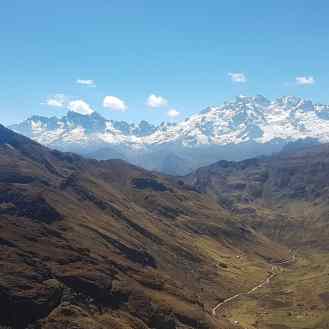Stepping out into the sun, I cling to my scarf as a cold breeze sweeps dust into the air. Teeth chattering, goosebumps forming, I make my way up the cobblestone path and keep an eye out for the señora with the small tea stand. In the plaza, the church doors are open and people have spilled out onto the sidewalk. Between the mass of sweaters, boots, beanies, and jackets, I spot the distinctive metal cart and jars containing colorful liquid. The señora greets me and I ask for an emoliente or herbal tea to go. She promptly scoops a few pink spoonfuls into a plastic bag, throws in a straw, ties the top off with a flourish, and trades me the bag for a one sol coin. The entire transaction takes about ten seconds. With the first few sips, a slow warmth spreads throughout my body, and I almost forget the biting cold.

Two weeks into my stay in Ollantaytambo, I now have some semblance of a routine: the morning walk to the Ayni Wasi office, hands warmed by an emoliente or cafecito, followed by meetings and literature reviews, lunch on lean wooden benches at the local mercado, afternoon tea and data analysis, and early dinners at places where I have “the usual”.
Although the work week is not over—we are preparing for our Women’s Health Fair tomorrow—I am taking advantage of an unexpectedly quiet morning to share what I will be working on this summer. Ayni Wasi (“House of Reciprocity” in Quechua) is a Peruvian organization that promotes health in the underserved rural communities of Peru’s Sacred Valley, and was founded to address prominent health disparities in high altitude Andean communities. It does this by training local women as promotoras (community health workers) to provide health education and basic care to their respective communities.

Ayni Wasi serves 13 communities in the Sacred Valley. The farthest are at least three hours away by car, and accessible only by a single-lane gravel road. Their isolation makes it time consuming and expensive to visit a health clinic, even for treatable conditions. Promotoras are often the only resource for health education and care, which makes them indispensable to the public health system.
Last Saturday, I accompanied Ayni Wasi staff to the community of Kelccanka to distribute vitamins and test infants for anemia. It took us about two hours by car, and the views were breathtaking.
Although the promotoras are not paid a salary, healthy food is used as an incentive to encourage promotoras to attend trainings, conduct house visits, and lead education assemblies. After the successful completion of a specific task, a promotora receives a bag that includes rice, lentils, and cooking oil, among other things.
The goal of my project is to better understand the link between the economic empowerment of the promotoras, their performance, and their motivation to provide health education and care. To that end, I am evaluating the current incentive model, identifying gaps and barriers, and recommending changes that might lead to improved performance by promotoras and better health outcomes in the population. I hope to put together the pieces through observations of promotoras interacting with their community members, one-on-one interviews with Ayni Wasi staff as well as promotoras, and a review of existing literature on this subject.
Promotora Julia teaching a group of students how to apply a tourniquet.
I am really looking forward to the next few weeks as I continue to visit the communities we work with and speak to promotoras who are helping their neighbors stay healthy and safe.











